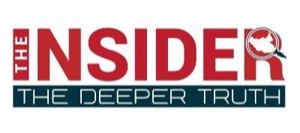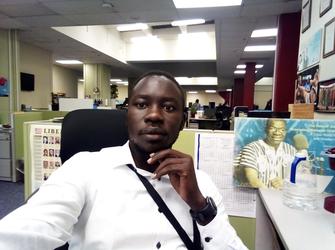In 2013, CCIJ Journalist David Mono Danga began his work in South Sudan to give a voice to South Sudanese people who did not have the platform or resources to speak up for themselves.
“When I went through my training to become a journalist, all I knew was I had to become a human rights reporter,” said Mono Danga, the managing editor of The Insider, a South Sudanese online newspaper. “I wanted to write about the issues and injustices that were affecting my community.”

Since establishing its independence in 2011, South Sudan has dealt with rampant misinformation in some of their most established news outlets. In response, The Insider’s mission has been to report on stories that are not adequately or honestly covered by the mainstream media.
Following the outbreak of civil war in the landlocked East African country in 2013 between the government-backed Dinka tribe and the anti-government Nuer tribe, misinformation has been used as a tactic by both sides to incite anger and fuel support. According to an article in Global Citizen, prominent members of each tribe have published uncorroborated claims about the opposing side, contributing to a cycle of violence. “Fake news in South Sudan has become too common and it is spreading wildly every day,” Mono Danga said.
While Mono Danga makes it a priority for his reporters to constantly fact check other outlets, he finds that they struggle to verify stories. “For us to keep track of every news story and fact check it quickly is very hard,” Mono Danga explained. “Essentially, we need to have a dedicated team that is always online looking at the news and checking whether it is fake or not.”
This past year the head of the Transitional Military Council, Mohamed Hamdan Dagalo, signed a peace agreement that aimed to end the revolution and restore stability to the country. Yet, a U.N. commissioners’ report released in February found that the implementation of this peace agreement has been stalled, due to political leaders who are stealing from big oil business and enabling violent attacks against civilians.
“The failure to implement the peace agreement has caused all sorts of conflicts in the rural part of the country,” Mono Danga said. “If the media does not give much attention to the peace agreement and its implementation, politicians will use coronavirus as an excuse to hide away from implementing the agreement.”
While already difficult, reporting on the revolution and transition of power in South Sudan has become nearly impossible during the pandemic, according to Mono Danga.
He explained that government offices now close around 1:00 PM and officials refuse to take interviews. “If you try to contact officials over the phone and they know you’re working on a sensitive news story, they will push you away,” he said.
In the past few months, Mono Danga explained that government officials have even turned off their phones in order to refuse calls.
The political conflict in South Sudan has also caused the government to crack down on non-government funded, independent journalism. In the past year, Reporters Without Borders ranked South Sudan 141 out of 180 countries in terms of freedom of the press.
At The Insider, Mono Danga is committed to the rights of journalists and works successfully to protect his reporters from threats. “As soon as our journalists report harassment of any kind, we write to the media authority and the union of journalists here in South Sudan,” he said. “This way we have media partners who can cover the story so that it can get the public’s attention.”
Mono Danga is equally concerned about the safety of his reporters in light of the coronavirus outbreak.
“It is not easy to get the kind of protective gear that will help prevent our journalists from contracting the virus,” he said, adding that even purchasing items like hand sanitizer is a financial strain on the organization.

Despite the threat that reporters face, fact-based journalism is an important element in curbing the spread of the virus. According to Worldometer, as of Wednesday July, 1, 2020 South Sudan has had 2,021 cases and 38 deaths; case numbers have been rising rapidly since the beginning of June. Even worse, Mono Danga claims, there are many additional people who may be positive and do not know, because of the country’s backlog of over 3,000 samples.
“I’m afraid our health system will be overwhelmed in the next few months if people do not start taking more precautions,” he said.
In South Sudan many still do not know about the real risk that COVID presents. “People here don’t know about the risk, so they go to the markets and parties, without caring if they’re positive, or not.”
Among all of these obstacles, Mono Danga has found support and hope through the CCIJ community: “Although I am still a new member of the CCIJ, I have learned a lot from reading work from CCIJ journalists. CCIJ has been sharing a lot of links to help reporters, which has been very helpful and I share these resources with my own reporters.”
Throughout the pandemic, in addition to providing an abundance of support and resources, CCIJ has dedicated its network to training journalists on how to most safely conduct investigative reporting during this time.
CCIJ’s mission of investigative collaboration is what Mono Daga believes is the future of journalism. “South Sudan will be a more peaceful and safe place, once journalists can come together for the purpose of gaining access to more information for national and international stories,” he said.
For more about journalists in South Sudan during Covid-19:
Mono Danga’s work:
The INSIDER South Sudan
Voice Of America
South Sudan President Warns Against Coronavirus-Related Hate Speech
Journalists Report Harrassment From South Sudan’s Media Authority
Collaborative Work
